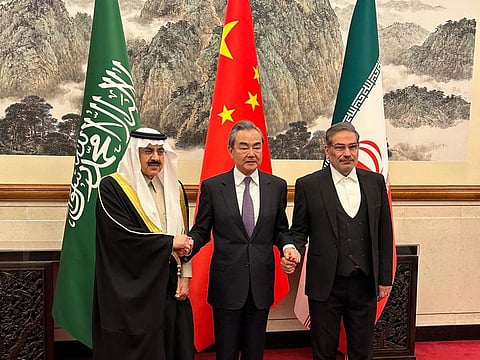Iran, Saudi Arabia to restore ties in China-brokered deal
UAE welcomes the resumption of diplomatic relations between Saudi Arabia and Iran

TEHRAN: Iran and Saudi Arabia agreed to restore ties and to reopen respective diplomatic missions after talks in China, state media in both countries reported Friday, seven years after relations were severed.
The two countries released a joint communique on the deal with China, which brokered the agreement as President Xi Jinping was awarded a third five-year term as leader earlier Friday
Riyadh cut ties with Tehran after Iranian protesters attacked Saudi diplomatic missions in the Islamic republic in 2016 following the Saudi execution of Shiite cleric Nimr Al Nimr.
“Following talks, the Islamic Republic of Iran and the Kingdom of Saudi Arabia have agreed to resume diplomatic relations and reopen embassies and missions within two months,” the official Iranian news agency Irna said, citing a joint statement, also published by official Saudi Press Agency.
Ali Shamkhani, the secretary of Iran’s Supreme National Security Council, had travelled to Beijing on Monday for “intensive negotiations with his Saudi counterpart in China in order to finally resolve the problems between Tehran and Riyadh”, IRNA said.
Iraq, a neighbour to both countries, had hosted several rounds of talks between Iran and Saudi Arabia since April 2021.
Those encounters were held at a relatively low level, involving security and intelligence officials.
Agreement to activate security, trade deals
In Friday’s statement, Iran and Saudi Arabia said they “thank the Republic of Iraq and the Sultanate of Oman for hosting the talks held between the two sides in 2021 and 2022 as well as the leaders and government of the People’s Republic of China for hosting and supporting the talks held in that country.”
“Saudi Arabia and Iran agree to respect state sovereignty and not interfere in internal matters,” the statement said, adding that the two countries’ foreign ministers will meet soon to arrange for the exchange of envoys and discuss means to enhance ties.
Riyadh and Tehran also agreed to activate the security cooperation agreement signed in 2001 and the trade, economy and investment agreement signed in 1998.
Iranian state media posted images and video it described as being taken in China of the meeting. It showed Ali Shamkhani, the secretary of Iran’s Supreme National Security Council, with Saudi national security adviser Musaad bin Mohammad Al Aiban and Wang Yi, China’s most senior diplomat.
Iranian state television said that the talks had been held over four days.
The joint statement calls for the reestablishing of ties and the reopening of embassies to happen “within a maximum period of two months.”
In the footage aired by Iranian media, Wang could be heard offering “whole-hearted congratulations” on the two countries’ “wisdom.”
“Both sides have displayed sincerity,” he said. “China fully supports this agreement.”
China, which recently hosted Iran’s hardline President Ebrahim Raisi, is also a top purchaser of Saudi oil. President Xi Jinping, just awarded a third five-year term as president earlier on Friday, visited Riyadh in December to attend meetings with Gulf Arab nations crucial to China’s energy supplies.
Iran’s state-run IRNA news agency quoted Shamkhani as calling the talks “clear, transparent, comprehensive and constructive.”
“Removing misunderstandings and the future-oriented views in relations between Tehran and Riyadh will definitely lead to improving regional stability and security, as well as increasing cooperation among Gulf nations and the world of Islam for managing current challenges,” Shamkhani was quoted as saying.
Saudis kept US informed on talks: White House
The United States on Friday said it welcomes a Chinese-brokered thaw in relations between rivals Iran and Saudi Arabia but expressed doubts that Tehran will follow through on its commitments.
White House National Security Council spokesman John Kirby said "we welcome" the diplomatic deal, adding it remains to be seen "whether Iran is going to meet their obligation."
“The Saudis did keep us informed about these talks that they were having, just as we keep them informed on our engagements, but we weren’t directly involved.”
The White House believes that internal and external pressure, including effective Saudi deterrence against attacks from Iran or its proxies, ultimately brought Iran to the table, Kirby said.
“We support any efforts to de-escalate tensions there and in the region. We think it’s in our interests, and it’s something that we worked on through our own effective combination of deterrence and diplomacy.” As for normalization of Saudi ties with Israel, he said, “it’s not clear that this arrangement affects that or is designed to deal with that, but we obviously continue to support normalisation.”
Earlier, a White House National Security Council spokesperson said the United States is aware of reports that Iran and Saudi Arabia have resumed diplomatic relations, but referred further details to the Saudis.
“Generally speaking, we welcome any efforts to help end the war in Yemen and de-escalate tensions in the Middle East region. De-escalation and diplomacy together with deterrence are key pillars of the policy President Biden outlined during his visit to the region last year,” the spokesperson told Reuters.
Sign up for the Daily Briefing
Get the latest news and updates straight to your inbox



